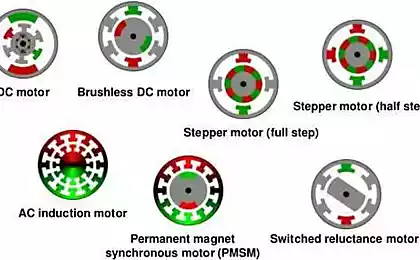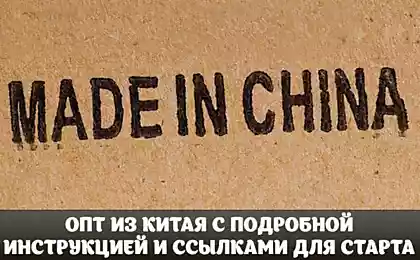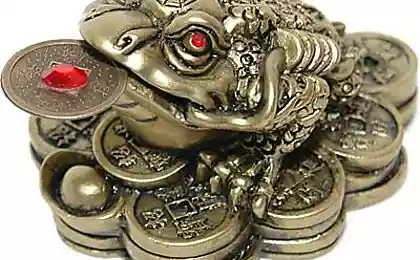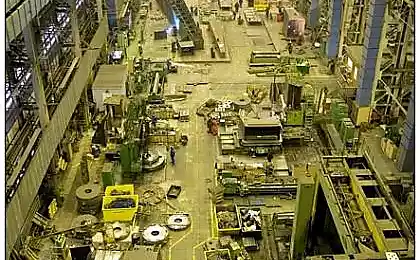1095
Chinese wiseacres
If the phrase "Chinese smart phone" in your mind there is an image of fake NokLa with two SIM-cards and a TV, this means that in their views of China and Chinese high-tech industry, you stayed in the mid-2000s
The incredible growth in the country has legal consequences - in China is improving the science base and, most importantly, there is the domestic purchasing power. Market "basement" craft is still large, but the companies have grown up on this level, tens, and the grandees of the world market of smartphones will soon have to make room - globally. In China, they have quite successfully moved the.
When I, as a group of journalists visited the Chinese electronics factory in 2007, we are not saying a word, we asked our hosts organized an excursion to the local "crust." On that tour, I came back with a trophy - NokLa N98 phone with a touch screen, start-up screen with your hands Nokia, sound scheme for Windows 95 and half the menu in Chinese (it is in the mode of an English interface). Oh yeah, I forgot to mention support for two SIM-cards and Analog TV - from the case put forward antenna rod. Smaller Chinese manufacturers are not necessarily engaged in forgery - some producing equipment under its own brand, but its features were roughly the same. These models were designed primarily for the domestic market. A major Chinese players, meanwhile, stamped for the global market the iPhone and Samsung, as well as producing the first independent model for the European mobile operators. All this, I repeat, it was five years ago. Workers at the plant while receiving 100-150 dollars a month, China's domestic market consumed predominantly "dumb" phones of local production.
Source
Sample NOKLY.
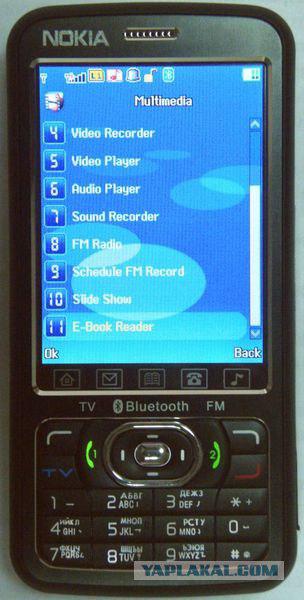
Today, China is the biggest in unit shipments year and most dynamic market, consuming smartphones. The growth over the last year amounted to 119%, sales - 77 million units! In 2012, it is expected that the figure will rise to 140 million. Ordinary Chinese people began to pay. The salary of a factory worker reaches $ 400, and with a variety of surcharges rose past 500. The country has a rapidly emerging middle class, consuming high-quality goods. For example, it is in China bought nearly 7 million iPhone in the first quarter of this year - a fifth of the world total! And this is there the standards for astronomical price of $ 790.
However, Apple is not the leader of the local market - in the hit parade of sales is dominated by Asian players. Their names are on our ear: Samsung, ZTE, Lenovo, Huawei. Besides leading Samsung, whose separation from the second place, however, is small, the rest of the company - the Chinese. One of the main reasons for this is the highly dynamic Chinese market. For example, the share of Apple, the former at the beginning of the year the second largest supplier, dropped significantly in the second quarter - a long time in China is difficult to sell the same smartphone. In the local market the new models come out almost on a daily basis. This place lacks even small companies, as China's 1 billion mobile subscribers, and more than half of those who buy a mobile phone this year selected smartphones. It is because of the value of the market and proximity to the production of even a small player with a tiny market share can get a significant amount of sales, and establish a base for the development and global expansion. Of course, provided that it makes high-quality product.
So why then Apple?
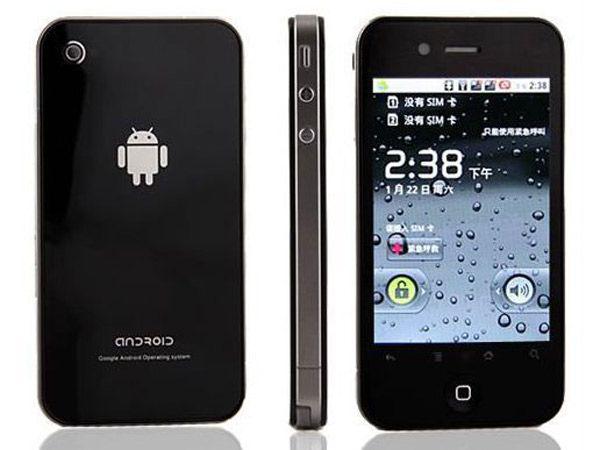
It is important to note that global players are often difficult to operate in China, since the products require complex localization and adaptation to local services. For example, according to reports Apple, active expansion in the Chinese market roughly coincided with a significant decrease in revenues from developers App Store in terms of a iOS-user. Interviews with the developers confirm the hypothesis - Chinese users and is rarely reluctant to buy applications in App Store. At the same time mobile services in the country developed very well, including paid. Just ecosystem services payments themselves are local. Global online players often do not hold significant market positions, and sometimes (Google) are actively out of the market. Therefore, preset the device Google, Twitter and Amazon, relatively speaking, is useless - China needs Baidu, Sina Weibo and Alibaba.
On contact with the Chinese consumers to go prepared!
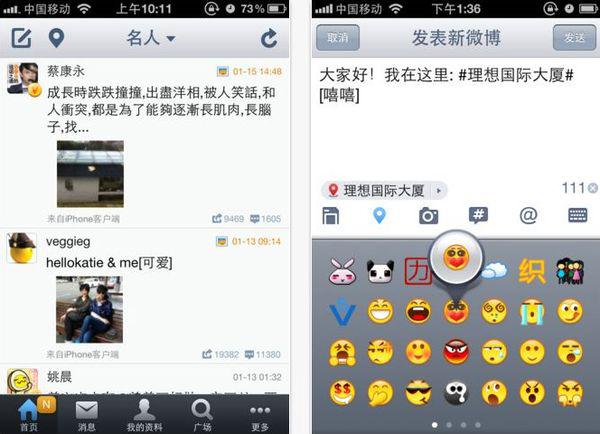
Perhaps it is time to dispel one of the biggest myths about the Chinese industry. China is not doing good or bad - China will order and how does a budget allocated. If the goods in the procurement costs three dollars, and you want to get it for two - maybe even get offended but then the quality. At the same time there are a lot of factories, production which meets the highest quality standards. Suffice it to recall that the iPhone is going to the city, Foxconn factory in China. This applies to all industries and all groups of goods - from plastic toys to spaceships. Incidentally, China, remember, one of the few countries with the active space program, and the percentage of successful launches of the Chinese today, among other things, higher than the Russian. However, the space - space, and smart phones, which are made to customers with high quality requirements, withstand the most rigorous test. Look in the shop on new models of Huawei devices or operator MTS. They do not crawl, creaks and falls.
In other countries you can go through operators
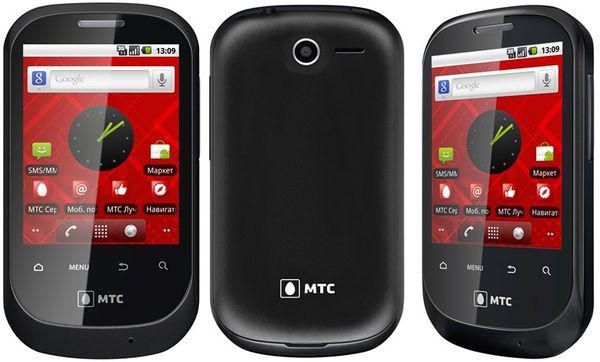
Of course, in addition to high production and high-quality materials to create a competitive smartphone need something different - a lot of sophisticated and proven technologies.
Problems of the Chinese in the first phase of their work was connected with the fact that the platform (primarily software) for high-quality phone was nowhere to take. In fact, the whole of China lived in several species "designer" Taiwan's MediaTek. The system on a chip such as MT6223, provide a full range of future mobile phone functionality - the support of GSM / GPRS to two SIM-cards to work with the camera module and image display. It is important that MediaTek chips finished completes its software platform. Client (the creator of the phone) can only modify the design of the buttons and icons to your liking, as well as to write or install additional applications. But at that time, MediaTek platform was not the pinnacle of ergonomics and functionality, so using it was impossible to compete with Samsung and Sony Ericsson.
MediaTek one time were the leaders of the Chinese market chipset
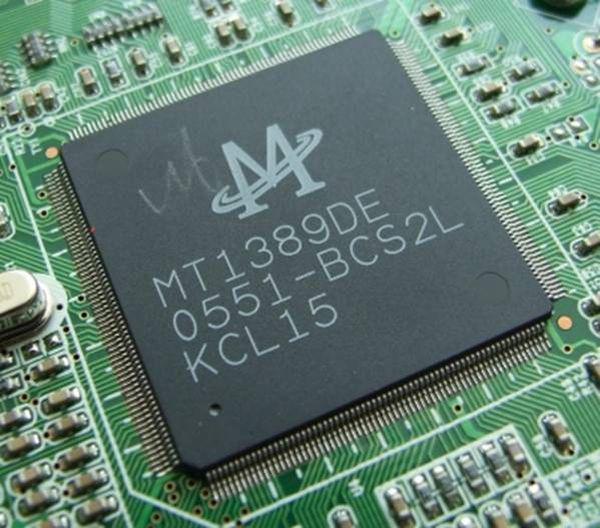
Helped the Chinese several events. Firstly, the European producers were not able to continue their business phone and sold it to the Chinese brand. The deal, tend to overlook not only the right to sculpt logo for Chinese products, but also something which intellectual property. TCL had assets of Alcatel, BenQ acquired the business of Siemens Mobile, and began to produce long-lasting SangFei model Philips Xenium. Quality software platform was not part of these transactions, but the engineering level of Chinese manufacturers rose.
Secondly, European and American mobile operators have shifted from additional branding Nokia cell phones or Samsung to manufacture models especially under its own brand. For these models, they turned to Chinese manufacturers. Operators needed a very high quality product (though cheap), so in the development and debugging software has been invested a lot of money and western intellectual work.
The third and most important event, a true gift to the Chinese, the emergence of Android. Before that, the market was popular, but not available for the Chinese Symbian, Blackberry OS, and others. Available to buy a license can be had on Windows Mobile, but it is, on the one hand, was complicated and not sufficiently popular with the other - the license price "bite". I am more than confident that the Chinese market selling pirated phones with Windows Mobile, but for expansion abroad, this option was not fit. And here - free, free, open source operating system, the possibility of modification. Solves two problems stroke - that Western, telephone-designed platform and a modern mobile OS.
At first things went so-so ...
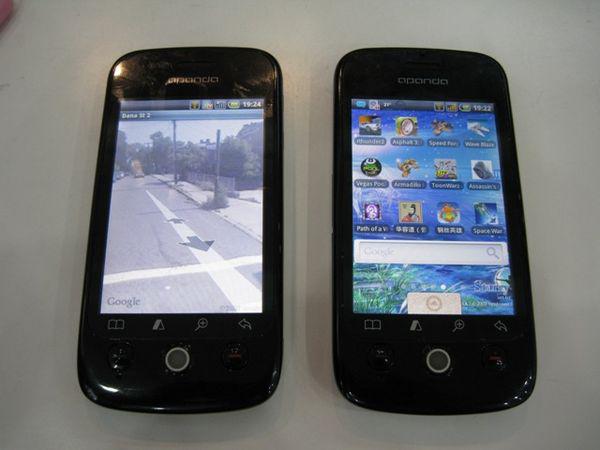
However, in the first stage on the feast of the Chinese Android late. Summed MediaTek, and the components industry as a whole. Available hardware platforms have a low power (200-300 MHz processors) only supports resistive screens are low resolution and so on. Therefore, although the Chinese smartphone Android 1.6 were fast enough to look at their work without tears it was impossible.
Today the industry is low-cost components, including chips, virtually eliminated the technological gap. He also produces a top designer of MediaTek MT6577, which contains a dual-core processor 1 GHz ARM Cortex-A9, PowerVR SGX graphics accelerator 5 Series, 3D-capable displays, screens to HD cameras and up to 8 megapixels. Thus, traditionally, you can make smart phones with two SIM-cards, and during the operation of the transmission of data on a single card is the second operational. What is even more interesting, this chip is an updated single-core MT6575, announced only at the end of June and is already (!) To buy smart phones based on it. This is the question about the speed of development and implementation in the Chinese industry. And yet, the question of quality. For those wishing to MediaTek can still produce old MT6223 processor with a clock frequency of 52 MHz. Well, you never know, suddenly want to phone someone for ten dollars.
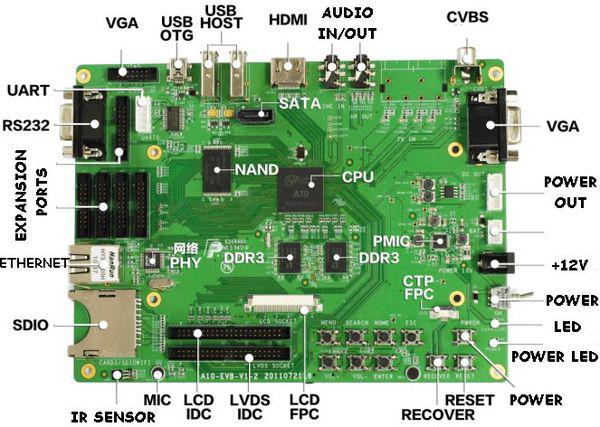
Now that private software platform MT largely lost its relevance, there was a niche for other Chinese chipmakers. In the market of smartphones and tablets currently stated RockChip and HiSilicon, and second, as a division of Huawei, at once, is no small thing, swung on a 4-core processor. In RockChip but there is a valid and very bright dual-core processor at 1, 5 GHz band, which this fall will be used in every second Chinese tablet. By smartphones RockChip products also apply, but they must be retrofitted chip modem (at least from the same HiSilicon), which complicates and increases the cost of construction of the phone. However, some Chinese manufacturers are on it for high-performance devices. Another interesting solution from China is the CPU AllWinner A10 / A13, although its manufacturers are more focused on chips for televisions. AllWinner can not boast of multi-core, but it has a very powerful video system capable of decoding HD-video vysokobitreytnoe.
The secret of the success of producers mentioned quite banal - thanks to a solid turnover which was the industry in recent years, companies have become rich enough and believe in their own future, to officially license the latest CPU architecture from ARM, a video accelerator - from PowerVR. "Bottleneck" restricting the potential of the Chinese chip maker, today is the lack of capacity to finer process technology. None of the mentioned products is not their own semiconductor factories, with the incarnation in silicon meet the contractor. China's largest plant is the SMIC, but today he is able to produce chips only on process technology of 40 nm and beyond, the Taiwanese neighbors TSMC have the right technology, but the throat with orders Qualcomm and NVIDIA (for all of these companies also do not have their own factories). < br />
Taiwanese factories for external peace work as turbovenik
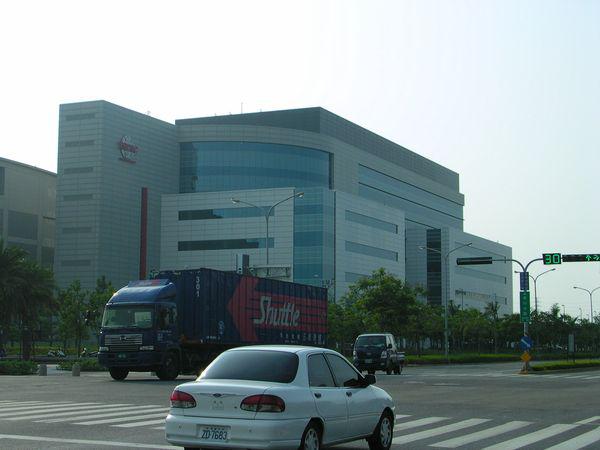
In principle, processors made by technology of 55-65 nm, is quite efficient at higher frequencies, but the heating may be great. The big problem is high energy consumption, but Chinese manufacturers are bolder than others in the installation of high-capacity batteries experimental. Where, for fear of overheating and fire, the Europeans put a certified battery 1300 mAh, the Chinese are strongly selected 2000 and even 2500 mAh. Today, such a battery gradually emerging and global brands, but in China, they are widely used for several years.
In general, in the high-end segment with top Chinese processors is almost nothing to boast of. However, for the domestic market is not required. The main segment in terms of today - smart phones cost about $ 150, and analysts expect that in the near future most of the smartphone will cost even cheaper - $ 100.
It was a mad price competition and, as a consequence, a small wage on each device sold, encourage Chinese manufacturers to look for new business models and new markets.
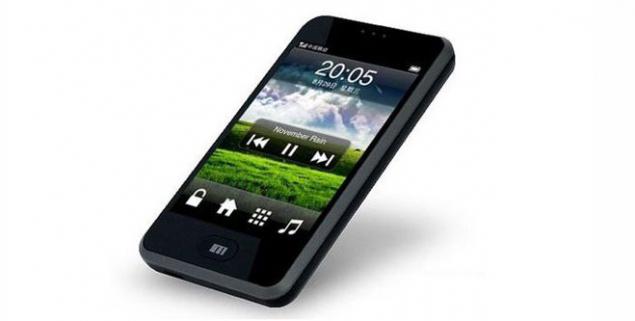
The most obvious way - is to neighbors in Europe. But to adapt to the local rules of the game can not every manufacturer. Also lower than the giants, price, and to offer European-style design, and warranty and ideally - to create value-added device: just set him naked Android is not enough.
With that can handle the largest companies (again, remember Huawei, Lenovo, ZTE), but there are chances and smaller. In this regard, a cautionary tale of two Chinese brands, which have recently been at the hearing of the Europeans: Meizu and Xiaomi. Meizu is a rather successful attempt to play in the segment of expensive smartphones - expensive by Chinese standards ($ 300-400). Pretty obvious borrowing design and UI elements the iPhone could be expensive in America, but gets away with successfully in Asia. However, after lengthy litigation with Apple on the model A8, Meizu has departed from Cupertino designs a little further, and the M9 and MX models developed with the support of the popular Chinese design bureau Eico. Another interesting feature is the use of models Meizu components from first-tier manufacturers - processor Samsung, Sharp screens and so on.
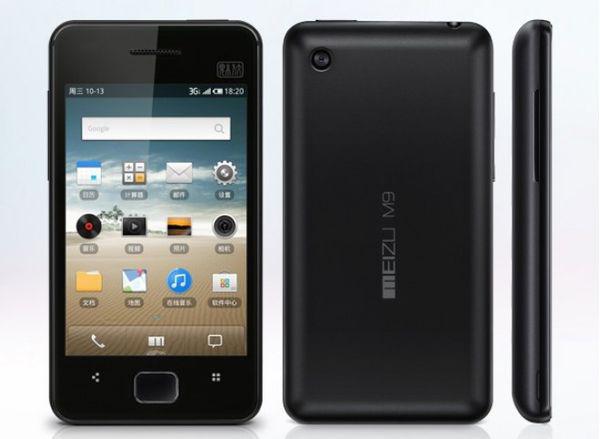
Because of this, at the time of smart phones Meizu have the top, it is absolutely relevant specification. In the latest models Meizu set Flyme OS - significantly redesigned Android 4.0, equipped with two dozen branded services. Services pretty obvious and popular on other platforms (or rather on a different platform?) - Phone Finder, Flyme message (analogue Whatsapp), Flyme sync, App center - all this can be set independently, but receive a set of "out of the box" definitely nice. The design "a la the iPhone», powerful stuffing and served a software, Meizu has fulfilled the sales plan for 2011 in its first quarter. An important success factor was the close contact with the consumer and the response to its requests - personally CEO Jack Wong regularly monitors corporate forum and often corresponds to the "mere mortals" to their questions and suggestions.
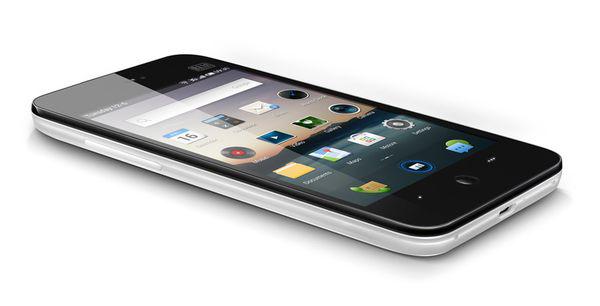
In general, the role of communication with the customer in China is much higher than in other countries, and this very communion can be a recipe for success. The company Xiaomi, which started its activity with the development of the popular Android-firmware MIUI, finally released its own mobile phone - the first device, which was originally set MIUI. Despite the lack of advertising and other customary promotions, phone Xiaomi Phone has sold 3, 5 million copies. In addition to working on the MIUI forums and social networks in China, the only event to promote smart phone users have been meeting like-minded (meet-up) in different cities of China. Sponsorship of these meetings is inexpensive, and they have one satisfied customer phone campaigns dozen others. The scheme is old, but in China it is surprisingly effective.
Positive vibrations are very important for Chinese users
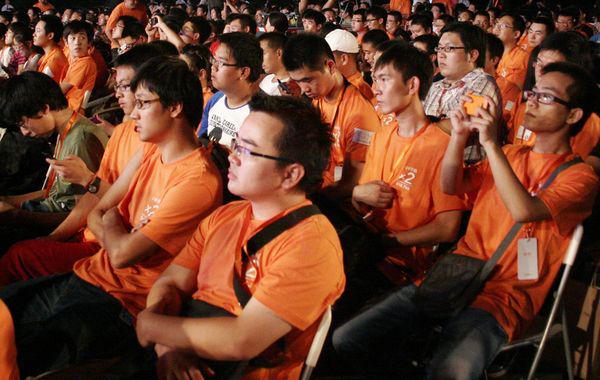
However, the recently announced Xiaomi Phone 2, which company founder Lei Jun (often referred to as "China Jobs") wants to bring already the world market will move outside of China is more traditional - to start through the operators. A very interesting fact is the zero profit Xiaomi. In repeated statements of the devices are sold at cost or even below it - to win a large and loyal customer base. Later Xiaomi involves making on services that are integrated into MIUI. The plan has already begun - proprietary chat service recently celebrated a major milestone - one million concurrent users. Meanwhile, absolutely modern all the specifications of the phone with HD-display and 4-core processor available for $ 310. But for those who think this amount is too large, the Chinese cooperators produced counterfeits Xiaomi (!). Thus, the local market has put the smart one step from Apple and Nokia.
Founder Xiaomi Lei Jun is not enough for New Balance 991 has to be photographed in his socks
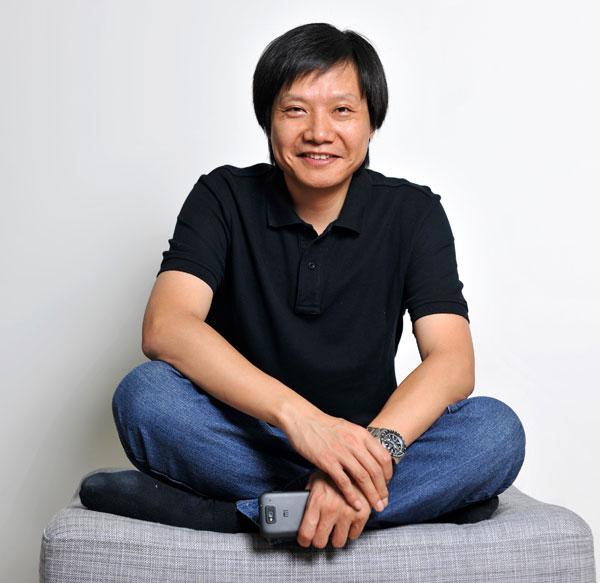
Very promising bid for services made the largest Chinese online supermarket Alibaba. Branded Aliyun OS for a variety of customization is not an Android, it is in-house development. True, too, with an element of fraud - through built-in emulator is started, many Android-app.
Source:
The incredible growth in the country has legal consequences - in China is improving the science base and, most importantly, there is the domestic purchasing power. Market "basement" craft is still large, but the companies have grown up on this level, tens, and the grandees of the world market of smartphones will soon have to make room - globally. In China, they have quite successfully moved the.
When I, as a group of journalists visited the Chinese electronics factory in 2007, we are not saying a word, we asked our hosts organized an excursion to the local "crust." On that tour, I came back with a trophy - NokLa N98 phone with a touch screen, start-up screen with your hands Nokia, sound scheme for Windows 95 and half the menu in Chinese (it is in the mode of an English interface). Oh yeah, I forgot to mention support for two SIM-cards and Analog TV - from the case put forward antenna rod. Smaller Chinese manufacturers are not necessarily engaged in forgery - some producing equipment under its own brand, but its features were roughly the same. These models were designed primarily for the domestic market. A major Chinese players, meanwhile, stamped for the global market the iPhone and Samsung, as well as producing the first independent model for the European mobile operators. All this, I repeat, it was five years ago. Workers at the plant while receiving 100-150 dollars a month, China's domestic market consumed predominantly "dumb" phones of local production.
Source
Sample NOKLY.

Today, China is the biggest in unit shipments year and most dynamic market, consuming smartphones. The growth over the last year amounted to 119%, sales - 77 million units! In 2012, it is expected that the figure will rise to 140 million. Ordinary Chinese people began to pay. The salary of a factory worker reaches $ 400, and with a variety of surcharges rose past 500. The country has a rapidly emerging middle class, consuming high-quality goods. For example, it is in China bought nearly 7 million iPhone in the first quarter of this year - a fifth of the world total! And this is there the standards for astronomical price of $ 790.
However, Apple is not the leader of the local market - in the hit parade of sales is dominated by Asian players. Their names are on our ear: Samsung, ZTE, Lenovo, Huawei. Besides leading Samsung, whose separation from the second place, however, is small, the rest of the company - the Chinese. One of the main reasons for this is the highly dynamic Chinese market. For example, the share of Apple, the former at the beginning of the year the second largest supplier, dropped significantly in the second quarter - a long time in China is difficult to sell the same smartphone. In the local market the new models come out almost on a daily basis. This place lacks even small companies, as China's 1 billion mobile subscribers, and more than half of those who buy a mobile phone this year selected smartphones. It is because of the value of the market and proximity to the production of even a small player with a tiny market share can get a significant amount of sales, and establish a base for the development and global expansion. Of course, provided that it makes high-quality product.
So why then Apple?

It is important to note that global players are often difficult to operate in China, since the products require complex localization and adaptation to local services. For example, according to reports Apple, active expansion in the Chinese market roughly coincided with a significant decrease in revenues from developers App Store in terms of a iOS-user. Interviews with the developers confirm the hypothesis - Chinese users and is rarely reluctant to buy applications in App Store. At the same time mobile services in the country developed very well, including paid. Just ecosystem services payments themselves are local. Global online players often do not hold significant market positions, and sometimes (Google) are actively out of the market. Therefore, preset the device Google, Twitter and Amazon, relatively speaking, is useless - China needs Baidu, Sina Weibo and Alibaba.
On contact with the Chinese consumers to go prepared!

Perhaps it is time to dispel one of the biggest myths about the Chinese industry. China is not doing good or bad - China will order and how does a budget allocated. If the goods in the procurement costs three dollars, and you want to get it for two - maybe even get offended but then the quality. At the same time there are a lot of factories, production which meets the highest quality standards. Suffice it to recall that the iPhone is going to the city, Foxconn factory in China. This applies to all industries and all groups of goods - from plastic toys to spaceships. Incidentally, China, remember, one of the few countries with the active space program, and the percentage of successful launches of the Chinese today, among other things, higher than the Russian. However, the space - space, and smart phones, which are made to customers with high quality requirements, withstand the most rigorous test. Look in the shop on new models of Huawei devices or operator MTS. They do not crawl, creaks and falls.
In other countries you can go through operators

Of course, in addition to high production and high-quality materials to create a competitive smartphone need something different - a lot of sophisticated and proven technologies.
Problems of the Chinese in the first phase of their work was connected with the fact that the platform (primarily software) for high-quality phone was nowhere to take. In fact, the whole of China lived in several species "designer" Taiwan's MediaTek. The system on a chip such as MT6223, provide a full range of future mobile phone functionality - the support of GSM / GPRS to two SIM-cards to work with the camera module and image display. It is important that MediaTek chips finished completes its software platform. Client (the creator of the phone) can only modify the design of the buttons and icons to your liking, as well as to write or install additional applications. But at that time, MediaTek platform was not the pinnacle of ergonomics and functionality, so using it was impossible to compete with Samsung and Sony Ericsson.
MediaTek one time were the leaders of the Chinese market chipset

Helped the Chinese several events. Firstly, the European producers were not able to continue their business phone and sold it to the Chinese brand. The deal, tend to overlook not only the right to sculpt logo for Chinese products, but also something which intellectual property. TCL had assets of Alcatel, BenQ acquired the business of Siemens Mobile, and began to produce long-lasting SangFei model Philips Xenium. Quality software platform was not part of these transactions, but the engineering level of Chinese manufacturers rose.
Secondly, European and American mobile operators have shifted from additional branding Nokia cell phones or Samsung to manufacture models especially under its own brand. For these models, they turned to Chinese manufacturers. Operators needed a very high quality product (though cheap), so in the development and debugging software has been invested a lot of money and western intellectual work.
The third and most important event, a true gift to the Chinese, the emergence of Android. Before that, the market was popular, but not available for the Chinese Symbian, Blackberry OS, and others. Available to buy a license can be had on Windows Mobile, but it is, on the one hand, was complicated and not sufficiently popular with the other - the license price "bite". I am more than confident that the Chinese market selling pirated phones with Windows Mobile, but for expansion abroad, this option was not fit. And here - free, free, open source operating system, the possibility of modification. Solves two problems stroke - that Western, telephone-designed platform and a modern mobile OS.
At first things went so-so ...

However, in the first stage on the feast of the Chinese Android late. Summed MediaTek, and the components industry as a whole. Available hardware platforms have a low power (200-300 MHz processors) only supports resistive screens are low resolution and so on. Therefore, although the Chinese smartphone Android 1.6 were fast enough to look at their work without tears it was impossible.
Today the industry is low-cost components, including chips, virtually eliminated the technological gap. He also produces a top designer of MediaTek MT6577, which contains a dual-core processor 1 GHz ARM Cortex-A9, PowerVR SGX graphics accelerator 5 Series, 3D-capable displays, screens to HD cameras and up to 8 megapixels. Thus, traditionally, you can make smart phones with two SIM-cards, and during the operation of the transmission of data on a single card is the second operational. What is even more interesting, this chip is an updated single-core MT6575, announced only at the end of June and is already (!) To buy smart phones based on it. This is the question about the speed of development and implementation in the Chinese industry. And yet, the question of quality. For those wishing to MediaTek can still produce old MT6223 processor with a clock frequency of 52 MHz. Well, you never know, suddenly want to phone someone for ten dollars.

Now that private software platform MT largely lost its relevance, there was a niche for other Chinese chipmakers. In the market of smartphones and tablets currently stated RockChip and HiSilicon, and second, as a division of Huawei, at once, is no small thing, swung on a 4-core processor. In RockChip but there is a valid and very bright dual-core processor at 1, 5 GHz band, which this fall will be used in every second Chinese tablet. By smartphones RockChip products also apply, but they must be retrofitted chip modem (at least from the same HiSilicon), which complicates and increases the cost of construction of the phone. However, some Chinese manufacturers are on it for high-performance devices. Another interesting solution from China is the CPU AllWinner A10 / A13, although its manufacturers are more focused on chips for televisions. AllWinner can not boast of multi-core, but it has a very powerful video system capable of decoding HD-video vysokobitreytnoe.
The secret of the success of producers mentioned quite banal - thanks to a solid turnover which was the industry in recent years, companies have become rich enough and believe in their own future, to officially license the latest CPU architecture from ARM, a video accelerator - from PowerVR. "Bottleneck" restricting the potential of the Chinese chip maker, today is the lack of capacity to finer process technology. None of the mentioned products is not their own semiconductor factories, with the incarnation in silicon meet the contractor. China's largest plant is the SMIC, but today he is able to produce chips only on process technology of 40 nm and beyond, the Taiwanese neighbors TSMC have the right technology, but the throat with orders Qualcomm and NVIDIA (for all of these companies also do not have their own factories). < br />
Taiwanese factories for external peace work as turbovenik

In principle, processors made by technology of 55-65 nm, is quite efficient at higher frequencies, but the heating may be great. The big problem is high energy consumption, but Chinese manufacturers are bolder than others in the installation of high-capacity batteries experimental. Where, for fear of overheating and fire, the Europeans put a certified battery 1300 mAh, the Chinese are strongly selected 2000 and even 2500 mAh. Today, such a battery gradually emerging and global brands, but in China, they are widely used for several years.
In general, in the high-end segment with top Chinese processors is almost nothing to boast of. However, for the domestic market is not required. The main segment in terms of today - smart phones cost about $ 150, and analysts expect that in the near future most of the smartphone will cost even cheaper - $ 100.
It was a mad price competition and, as a consequence, a small wage on each device sold, encourage Chinese manufacturers to look for new business models and new markets.

The most obvious way - is to neighbors in Europe. But to adapt to the local rules of the game can not every manufacturer. Also lower than the giants, price, and to offer European-style design, and warranty and ideally - to create value-added device: just set him naked Android is not enough.
With that can handle the largest companies (again, remember Huawei, Lenovo, ZTE), but there are chances and smaller. In this regard, a cautionary tale of two Chinese brands, which have recently been at the hearing of the Europeans: Meizu and Xiaomi. Meizu is a rather successful attempt to play in the segment of expensive smartphones - expensive by Chinese standards ($ 300-400). Pretty obvious borrowing design and UI elements the iPhone could be expensive in America, but gets away with successfully in Asia. However, after lengthy litigation with Apple on the model A8, Meizu has departed from Cupertino designs a little further, and the M9 and MX models developed with the support of the popular Chinese design bureau Eico. Another interesting feature is the use of models Meizu components from first-tier manufacturers - processor Samsung, Sharp screens and so on.

Because of this, at the time of smart phones Meizu have the top, it is absolutely relevant specification. In the latest models Meizu set Flyme OS - significantly redesigned Android 4.0, equipped with two dozen branded services. Services pretty obvious and popular on other platforms (or rather on a different platform?) - Phone Finder, Flyme message (analogue Whatsapp), Flyme sync, App center - all this can be set independently, but receive a set of "out of the box" definitely nice. The design "a la the iPhone», powerful stuffing and served a software, Meizu has fulfilled the sales plan for 2011 in its first quarter. An important success factor was the close contact with the consumer and the response to its requests - personally CEO Jack Wong regularly monitors corporate forum and often corresponds to the "mere mortals" to their questions and suggestions.

In general, the role of communication with the customer in China is much higher than in other countries, and this very communion can be a recipe for success. The company Xiaomi, which started its activity with the development of the popular Android-firmware MIUI, finally released its own mobile phone - the first device, which was originally set MIUI. Despite the lack of advertising and other customary promotions, phone Xiaomi Phone has sold 3, 5 million copies. In addition to working on the MIUI forums and social networks in China, the only event to promote smart phone users have been meeting like-minded (meet-up) in different cities of China. Sponsorship of these meetings is inexpensive, and they have one satisfied customer phone campaigns dozen others. The scheme is old, but in China it is surprisingly effective.
Positive vibrations are very important for Chinese users

However, the recently announced Xiaomi Phone 2, which company founder Lei Jun (often referred to as "China Jobs") wants to bring already the world market will move outside of China is more traditional - to start through the operators. A very interesting fact is the zero profit Xiaomi. In repeated statements of the devices are sold at cost or even below it - to win a large and loyal customer base. Later Xiaomi involves making on services that are integrated into MIUI. The plan has already begun - proprietary chat service recently celebrated a major milestone - one million concurrent users. Meanwhile, absolutely modern all the specifications of the phone with HD-display and 4-core processor available for $ 310. But for those who think this amount is too large, the Chinese cooperators produced counterfeits Xiaomi (!). Thus, the local market has put the smart one step from Apple and Nokia.
Founder Xiaomi Lei Jun is not enough for New Balance 991 has to be photographed in his socks

Very promising bid for services made the largest Chinese online supermarket Alibaba. Branded Aliyun OS for a variety of customization is not an Android, it is in-house development. True, too, with an element of fraud - through built-in emulator is started, many Android-app.
Source:




